Carden Surname Ancestry ResultsOur indexes 1000-1999 include entries for the spelling 'carden'. In the period you have requested, we have the following 329 records (displaying 191 to 200): Single Surname Subscription | | | Buying all 329 results of this search individually would cost £1,698.00. But you can have free access to all 329 records for a year, to view, to save and print, for £100. Save £1,598.00. More... |
These sample scans are from the original record. You will get scans of the full pages or articles where the surname you searched for has been found. Your web browser may prevent the sample windows from opening; in this case please change your browser settings to allow pop-up windows from this site. Carpenters Excluded from the Union: King's Cross
(1865)
Each annual report of the Amalgamated Society of Carpenters and Joiners included a list of excluded members, arranged by branch. The great majority of the exclusions were for non-payment of entrance money or arrears, but other reasons are cited from time to time - fraud; bringing the society into discredit; dishonesty; entering the society under false pretences; working contrary to the society's interest; not being a competent workman. In most cases names are given in full.
CARDEN. Cost: £6.00.  | Sample scan, click to enlarge

| East Kent Registered Electors: Chislet
(1865)
The poll for two knights of the shire to represent the Eastern Division of the county of Kent in parliament was taken 18 July 1865, the candidates being Sir Edward Cholmeley Dering, bart., (D), Sir Brook William Bridges, bart., (B), and Sir Norton Joseph Knatchbull, bart., (K). This poll book lists all registered electors, whether they voted or not, by electoral district (Ashford, Canterbury, Dover, Faversham, Hythe, Margate, Ramsgate, Romney, Sandwich, Sheerness, Sittingbourne, Whitstable and Wingham) and then by township or parish within which lay the property whereby the electors had qualified. The lefthand column gives sequential number in the whole volume; then follows the elector's full name, surname first, and his address (often elsewhere); and on the righthand side for whom he voted. When the elector was qualified in duplicate the vote is recorded opposite to the number upon which he claimed to vote at the polling booth, and wherever his name occurs elsewhere a reference is made, immediately after the address, to the number where his vote is recorded, with the initials of the candidates for whom he voted. Duplicate voters who were dead at the time of the election, or did not vote, are printed in italics to signify that they did not vote, or are stated to be dead once only; and wherever the names of such electors occur elsewhere references are made to the numbers where alone they are reckoned in the abstract of the poll as dead or not voting. Whenever a number only, without any other reference, follows the address, it denotes that at the number referred to, the elector is entered as not voting. CARDEN. Cost: £6.00.  | Sample scan, click to enlarge

| East Kent Registered Electors: Whitstable
(1865)
The poll for two knights of the shire to represent the Eastern Division of the county of Kent in parliament was taken 18 July 1865, the candidates being Sir Edward Cholmeley Dering, bart., (D), Sir Brook William Bridges, bart., (B), and Sir Norton Joseph Knatchbull, bart., (K). This poll book lists all registered electors, whether they voted or not, by electoral district (Ashford, Canterbury, Dover, Faversham, Hythe, Margate, Ramsgate, Romney, Sandwich, Sheerness, Sittingbourne, Whitstable and Wingham) and then by township or parish within which lay the property whereby the electors had qualified. The lefthand column gives sequential number in the whole volume; then follows the elector's full name, surname first, and his address (often elsewhere); and on the righthand side for whom he voted. When the elector was qualified in duplicate the vote is recorded opposite to the number upon which he claimed to vote at the polling booth, and wherever his name occurs elsewhere a reference is made, immediately after the address, to the number where his vote is recorded, with the initials of the candidates for whom he voted. Duplicate voters who were dead at the time of the election, or did not vote, are printed in italics to signify that they did not vote, or are stated to be dead once only; and wherever the names of such electors occur elsewhere references are made to the numbers where alone they are reckoned in the abstract of the poll as dead or not voting. Whenever a number only, without any other reference, follows the address, it denotes that at the number referred to, the elector is entered as not voting. CARDEN. Cost: £6.00.  | Sample scan, click to enlarge

| Patentees of New Inventions
(1865)
Abstracts of British patents for new inventions applied for and granted from 1 January to 31 December 1865: giving date, name and address, and short description of the invention. It is then stated whether 'Letters patent sealed' or 'Provisional protection only'.CARDEN. Cost: £6.00.  | Sample scan, click to enlarge
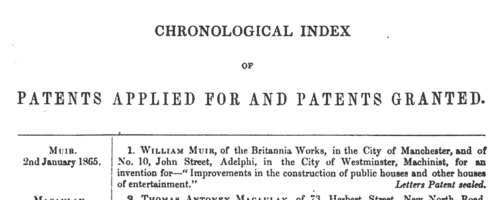
| Boys entering Trinity College, Glenalmond
(1867)
Trinity College, Glenalmond, Perthshire, was originally founded as a college at which young men might be trained for the ministry of the Scottish Episcopal Church, and the sons of the laity might be educated and brought up in the faith and tradition of the Church. In 1876 the Theological College was transferred to Edinburgh, Glenalmond remaining as a boys' school. This second edition of the school register, edited by G. St Quintin, was published in 1955, incorporating the text of the first edition prepared by E. W. Neish. The scholars are listed by term of entering the school, and then alphabetically by surname; the details then given are full christian names, date of birth; name of father; any distinctions within the school; and then a career synopsis, with date and place of death where known. CARDEN. Cost: £6.00.  | Sample scan, click to enlarge
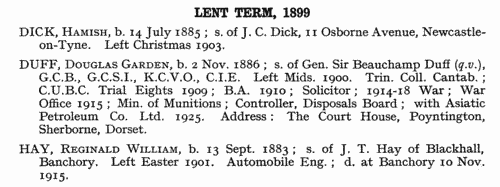
| Boys entering Wellington College in Berkshire
(1867)
Wellington College, near Wokingham, was originally founded for the education of sons of military officers. A register of boys entering the school from First Term 1859 to Michaelmas 1933 was compiled by F. G. Lawrence for the Old Wellingtonian Society. In each entry the boy's name is given in full, in bold, surname first; age at entry (usually 11 to 14); then, in brackets, the name of the dormitory or house to which he belonged, in italics, with the years of his stay; then his father's name (usually surname and initials, but not christian name) with military decorations where appropriate. School prefects and captains are noted as such; if the boy played cricket for the school, XI with the years; academic honours, scholarships, &c.; a brief biography; and date of death, or (where known) address in 1933. Year of marriage is given, and sometimes the wife's name and/or her father's name. Clearly, those boys who kept contact with the school and/or had distinguished military careers have detailed entries; others disappeared into oblivion on leaving.CARDEN. Cost: £6.00.  | Sample scan, click to enlarge
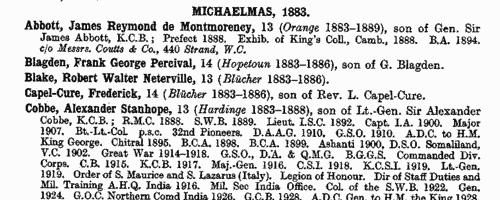
| Electors for Southam
(1868)
A poll for the election of two knights of the shire to represent South Warwickshire was held 24 November 1868: the candidates were Lord Hyde (H.), Sir R. N. C. Hamilton (H.), H. C. Wise, Esq. (W.) and John Hardy, Esq. (H.). This poll book lists all those electors who voted; the county franchise included not only male freeholders of 40s a year, but also £10 copyholders and long-leaseholders, and £50 short-leaseholders and tenants. In addition, where no vote was cast the elector's number and name are given, the name in italics. The names are arranged by polling district and then by parish or township. Freeholders holding requisite property in a district are listed there, but might well reside elsewhere. The right-hand column indicates how each man voted. CARDEN. Cost: £4.00.  | Sample scan, click to enlarge
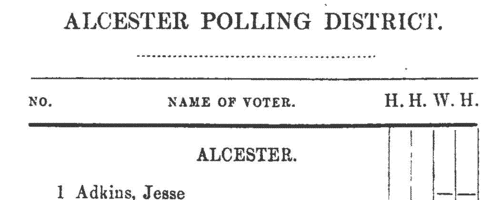
| Inhabitants of Worcester
(1868)
Gentry, farmers and traders listed in J. E. R. Kelly's Post Office Directory of Worcestershire. (The sample scan is of the section for the little parish of Hadzor)CARDEN. Cost: £6.00.  | Sample scan, click to enlarge

| Stockton-on-Tees Voters: Norton Polling District
(1868)
This poll book for the First Parliamentary Election for the Borough of Stockton-on-Tees lists the voters alphabetically by polling district, with full name (surname first) and address. In the right-hand column D represents the Liberal candidate, Joseph Dodds, Esq., and V the Conservative, Lord Ernest Vane Tempest. The three polling districts were Norton, Stockton (including so much of Linthorpe as lay within the parliamentary borough of Stockton), and Thurnaby. At the end of each district the handful of lodger voters are listed separately.CARDEN. Cost: £4.00.  | Sample scan, click to enlarge

| Boys entering Wellington College in Berkshire
(1869)
Wellington College, near Wokingham, was originally founded for the education of sons of military officers. A register of boys entering the school from First Term 1859 to Michaelmas 1933 was compiled by F. G. Lawrence for the Old Wellingtonian Society. In each entry the boy's name is given in full, in bold, surname first; age at entry (usually 11 to 14); then, in brackets, the name of the dormitory or house to which he belonged, in italics, with the years of his stay; then his father's name (usually surname and initials, but not christian name) with military decorations where appropriate. School prefects and captains are noted as such; if the boy played cricket for the school, XI with the years; academic honours, scholarships, &c.; a brief biography; and date of death, or (where known) address in 1933. Year of marriage is given, and sometimes the wife's name and/or her father's name. Clearly, those boys who kept contact with the school and/or had distinguished military careers have detailed entries; others disappeared into oblivion on leaving.CARDEN. Cost: £6.00.  | Sample scan, click to enlarge
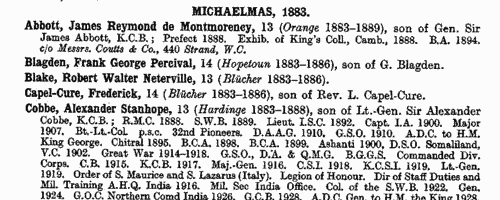
|
Research your ancestry, family history, genealogy and one-name study by direct access to original records and archives indexed by surname.
|












